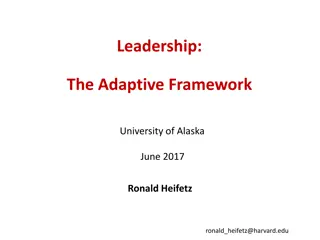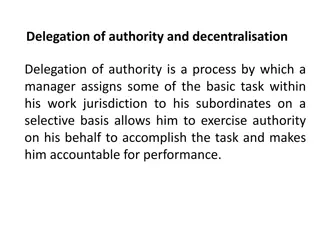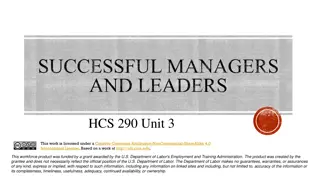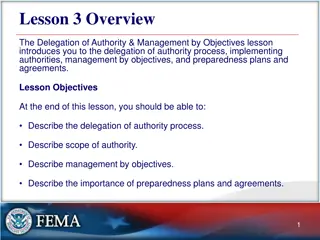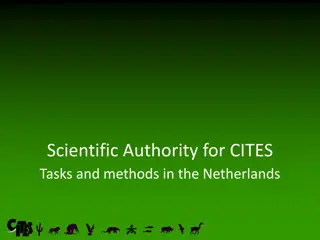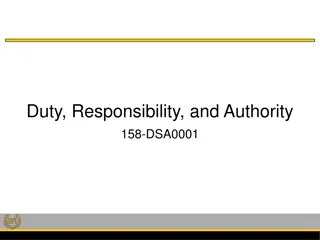Understanding Leadership and Authority in Management
Leadership is a crucial aspect of management, involving directing, influencing, and motivating employees to achieve organizational goals. It's about inspiring confidence and support to drive productivity, quality, and satisfaction. Authority complements leadership, dealing with the power to make decisions and influence others. This synopsis explores the meanings, definitions, characteristics, and types of leadership and authority, emphasizing the importance of confidence, motivation, and effective communication in leading and managing teams.
Download Presentation

Please find below an Image/Link to download the presentation.
The content on the website is provided AS IS for your information and personal use only. It may not be sold, licensed, or shared on other websites without obtaining consent from the author. Download presentation by click this link. If you encounter any issues during the download, it is possible that the publisher has removed the file from their server.
E N D
Presentation Transcript
SYNOPSIS LEADERSHIP Introduction Meaning Definition Characteristics Importance Qualities Types AUTHORITY Meaning Definition Characteristics Types
Leadership is one of the most important function of management. Leading involves directing, influencing&motivating employees to perform
Meaning The ability to inspire confidence and support among the people who are needed to achieve organizational goals. Leadership Effectiveness refers to attaining desirable outcomes such as productivity, quality, and satisfaction in a given situation.
Definition Leadership is the ability of a manager to induce sub-ordinates to work with confidence & zeal . -Koontz o Donnell Leadership is ultimately about creating a way for people to contribute to making something extraordinary happen . Alan Keith
It is the personal quality of a person It is a process of influencing others It requires the confidence of followers/ subordinates It requires motivation of subordinates CHARACTERISTICS OF LEADERSHIP
A) Leadership , to a considerable extent, is as in-born or inherent quality of a person. It is the personal quality of a person B) It is the potentials of the manager that determine his ability to guide, direct and co-ordinate the activities of his subordinate.
A) Leadership is a process of influencing others to act. It is a process of influencing others B) The success of leadership lies in the willingness of the subordinate to comply with the directions of the manager.
To be accepted a leader, the manager must gain the confidence of his subordinates. It requires the confidence of followers/subordinates
The leader is expected to motivate or induce his subordinates to work. By giving directions, orders and instructions along , the manager may not be able to get things done. It requires motivation of subordinates
The subordinates need to be guided, influenced, controlled and induced to work continuously for the attainment of the organisational goal. Leadership is a continuous process
Importance of Leadership. Acts as an aid to authority. Needed at all levels on management. Rectifies the imperfectness of the formal organisational relationship. Basis for co-operation. Improves motivation and morale.
Qualities of a good leader Multicultural sensitivity Focus Intelligence Ability to inspire Commitment Passion Ability to connect Willingness to make mistakes Vision Positive attitude
Autocratic Leader An autocratic leader wants his subordinates to work in the manner he wants. He tells them what should they do, where, when, and how. He specifies the goal ,makes available the resources that he thinks are enough and sets the deadline within which the subordinates will have to complete the task Democratic Leader Such a style of leadership is known as participative leadership A democratic leader does not make unilateral or one sided decisions. He allows his subordinates to discuss the problem and put forth their views freely.The final decisions will be made based on the concensus of all.
Laissez-Faire Leader Laissez faire leader is a policy of non-interference. Also known as free-rain leader , a laissez fair leader gives full freedom to his followers to act. He does not lay down guidelines within which his followers have to work. He neither influences the subordinates 'decisions nor does he interfere in the process of decision-making. Functional Leader A functional leader is one who is an expert in a particular field of activity. He has risen to the position of a leader by virtue of certain special skills that he possesses. He does not command any formal authority. Such a leader always thinks of the task he has undertaken and spends most of his time finding out ways and means of doing it better.
Institutional leader An institutional leader is one who has become a leader by virtue of his official position in the organization heirarchy.For ex: A person appointed as the general manager of a concern. An institutional leader may not be an expert in his field of activity. He may ,become demanding and thereby incur this displeasure of his subordinates. Paternalistic leader A paternalistic leader takes care of his followers in the way the head of a family takes care of the family members. He is mainly concerned with the well-being of his followers and is always ready to protect them. He may provide them with all the physical amenities needed. But he will not be able to guide them to perform their job well.
CONCLUSION However, the existence of substitutes for leadership does not necessarily mean that leadership is unimportant or leaders do not really matter much. Instead ,it presents the complexity of the world in which leaders have to function. Researches support that leadership is an extremely important function that bears enormous influence on the effective functioning of groups in organisations , business or non-business organisations. However, the complexity of the situation may sometimes prevent us from knowing in advance which particular leadership style will be the most effective.
Meaning : Authority. The power or right to give orders, make decisions, and enforce obedience. (OR) The right to act in a specified way, delegated from one person or organization to another.
Authority is the right to give orders and the power to exact obedience -Henry Fayol Authority is the principle at the root of Organisation and so importen that it is impossible to conceive of an organisation at all unless some person or persons are in a position to require action of others. -Mooney and Reily
Legitimacy Dominance An informal power Rationality Accountability
Legitimacy: It determines the effectiveness of authority. Hence it is the hall mark of the concept of authority. According to Robert Dahl A commands B and B feels A has perfect right to do so and to which he has complete obligation to obey. Power of this kind is often said to be legitimate. Legitimate power is often called authority.
Dominance: Authority is capacity of the individual to command others. An individuals or a group which possesses authority exercises dominance over other individuals. Authority is a command of superior to an inferior.
An informal power: It is not a formal power as it lacks characteristics Which are the main features of power. According to Fredrick Authority is not a power but something that accompanies power . It is the quality in men and things which adds to their power , something which creates power but it is not itself power.
Rationality: This is the main characteristic of authority. In the words of Fredrick, The man who has authority possesses something that I would describe as the capacity for reasoned elaboration for giving convincing reasons for what he does or proposes to have others to do .Evidently the basis of authority is logic or reason.
Accountability: The individual or a group of individuals who possess authority are responsible to some higher authority. In a democratic system accountability is the most significant characteristic of authority.
Types of Authority Traditional Authority Legal Authority Charismatic Authority
Traditional Authority Such tradition is derived from tradition. The eldest son for a king will succeed the king was the tradition in older days. He becomes the king by virtue of being eldest in the family. According to the tradition of the family or society such conditions are still prevalant in backward societies
Charismatic authority This type of authority is derived from the values that legitimate charismatic authority. The person having charismatic authority may possess some divine or supernatural powers which attracts the followers such leader may be in political field or religious field or any others field. But this type of authority sets with the person. As a soon as such persons disappears from the scene authority also disappears
Legal Authority Legal authority is derived from principles and practices, rules, regulations, policies, norms lay down by the institution for the systematic of the organisation to achieve certain specific goal. This authority is not based on any tradition or charisma but is given by the organisation to a position in the organisation. Any person who occupies that positions enjoys that authority regardless of his backround or personality. his competency or merit is the only consideration.
QUESTIONS 1)Define leadership 2) Explain the characteristics of leadership 3) State the importance of leadership 4) What are the qualities of good leadership? 5) Enumerate the different types of leadership 6)Define authority 7)State the characteristics of authority 8)Explain the different types of authority
CONCLUSION In sociology authority is the legitimate power which one person or group holds and exercises over another .the element of legitimacy is vital to the notion of authority and in the main means by which authority is distinguished from power .Thus authority depends on the acceptance by subordinate of the right of those above them to give orders Therefore it flows from top to bottom giving authority to superior over the subordinates.


